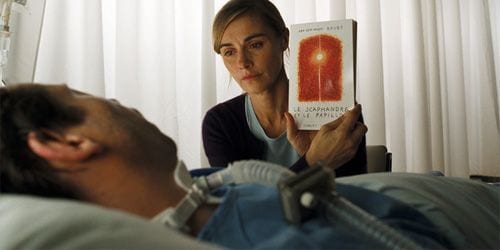
“As you’ll have realized,” says Dr. Lepage (Patrick Chesnais), “you can’t speak.” He looms before the camera, his thin lips and plaid shirt collar fluttering in watery light. “Think of me as your friend,” the doctor smiles, even as he delivers devastating news to Jean-Dominique Bauby (Mathieu Amalric), emerging from a coma at the start of The Diving Bell and the Butterfly (Le Scaphandre et le Papillon). The Elle France editor has suffered a devastating stroke at the age of 43, effecting his “locked-in syndrome,” complete immobility alongside complete comprehension.
The movie follows the outline of Bauby’s memoir, not only recounting his former, super-glam playboy life, but also reckoning with his current condition, asserting a self without speech or gesture — save for his left eye, whose blinking is his only means of communication. Trapped inside his body, Baudy’s perspective is rendered here through from point-of-view framing and a voiceover indicating his feisty sarcasm and occasional self-pity. He recalls his past in flashbacks (primarily, interactions with various fashion-modelish women) and imagines an alternative present via hallucinatory metaphors, like the titular diving apparatus (with predictable heavy breathing), Arctic ice crumbling into the sea, and floaty suggestions of what a butterfly might see.
Such imagery illustrates Bauby’s suddenly restricted physicality and expanding imagination, his banality and resilience. On meeting speech therapist Henriette (Marie-Josée Croze), Bauby’s reaction is flirtatious in his own mind. “Am I in heaven?” he muses, as the camera lists toward her breasts and she keeps her focus on the work at hand: “You can blink, right?” She devises a system by which he can communicate by blinking on specific letters spoken by his interlocutor, a technique that enables the writing of his memoir, with a publishing assistant, Claude (Anne Consigny), painstakingly transcribing one letter at a time. “My first word,” he tells himself, “is I, myself.”
While Diving Bell extols Bauby’s will to live, as well as his supreme effort to write the book (“My task now,” he says, “is to write the motionless travel notes, from a castaway on the shores of loneliness”), this first word is telling. For as the movie explores the possibilities of self without the usual, legible indications, it also translates this courage and effort into compositions that mimic Bauby’s previous, prodigious appetites, the “I” he misses and continues to envisage. The movie’s essential trick — the POV imagery that exemplifies a worldview, the mostly stationary frame, warpy wide angles and smudgy pastels emulating his disorientation — is clever, but also limited.
The trick takes a next step from techniques on display in artist/director Julian Schnabel’s previous biographical films. The heroes of Basquiat and Before Night Falls, the innovative graffitist and the Cuban poet Reinaldo Arenas, were also possessed of great strength and spirit. Though both men were overwhelmed by circumstance — by addiction and authority — they were also, before everything else, artists, given to self-expression by extraordinary means. Bauby, by contrast, is made extraordinary by his affliction; he discovers and delineates another self in writing, but it is his story, more than his gift or skill, that is astonishing. And so Schnabel and cinematographer Janusz Kaminski must fill in, their visual choices offering a sort of faux access to Bauby’s interior life, and moreover, a paean in light and color.
Beyond earning Schnabel a Best Director award at Cannes, the impressionistic framing and smeary edges also achieve thematic ends. Perhaps most significantly, they intimate Bauby’s subjective sliding between past and present, as when he remembers shaving his aging father (Max von Sydow), a tender memory in which the son now recognizes his own future/present. Bauby’s past regrets include giving up a plane ticket to his friend Roussin (Niels Arestrup), which resulted in the latter’s being taken hostage by hostage by terrorists in Beirut, where he was kept for four years. While Bauby is forgiven, he’s also haunted by the notion that his current condition is a cosmic sort of payback, that his world is not random, but determined and definitively moral.
The most obvious manifestation of such order is Bauby’s collapse of the sentimental and the sexual. His most vibrant fantasies feature women, as when he imagines a sexy, sloppy meal of oysters, shrimp, and tongue kisses with Claude, their mutual desire realized, before the scene cuts back to his crumpled figure in his wheelchair, Claude smoking her cigarette furiously in the foreground. Or again, he spends a day at the beach at Berck-sur-Mer with his young children and their mother, Céline (Emmanuelle Seigner), he gazes at her in close-up as the three kids gambol in the blurry background. While the holiday occasions Bauby’s brief consideration of what it means to be a parent (“Even a sketch, a shadow, a fragment of a dad is still a dad”), it also reinforces the film’s focus on him, bound and longing. Céline leans into the camera, cooing, “It’s great that you’re writing [the book]. You’re the most amazing man I ever met.” The camera cuts to a shot of her leg under a flimsy sundress as she pages through the manuscript, approximating but also diminishing Bauby’s desire.
The scene insists on the distance between Bauby’s best self-image as the good father (“Words can’t express the grief that engulfs me. I, their father, can’t even ruffle their hair, pinch their downy necks, or clasp their smooth, warm little bodies”) and his worst. Feeling reduced now to a “zombie,” denied what he most wants, sensual pleasures and connections, he’s angry and grateful at once. That gap is the movie’s most affecting dilemma, unresolved by its many aesthetic effects.
